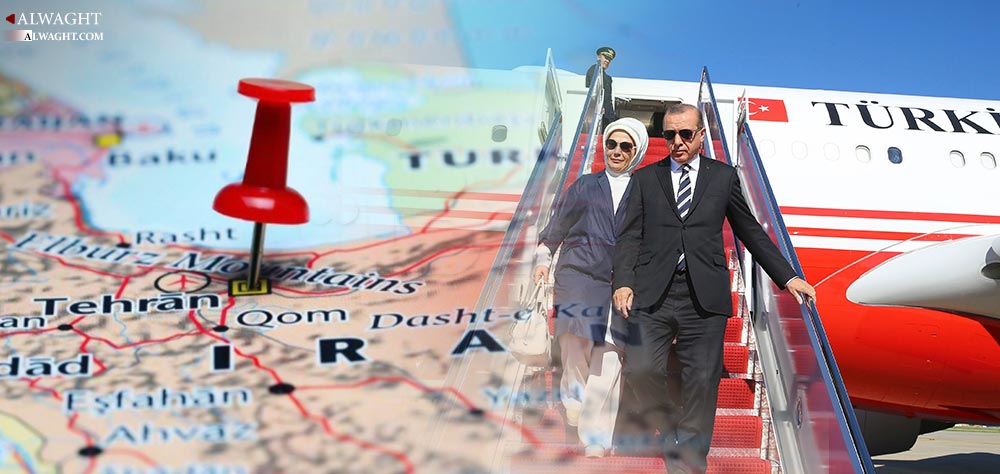Alwaght- The Turkish President Recep Tayyip Erdogan is scheduled to visit Iran today for talks with the Iranian officials on a set of issues.
The Turkish Chief of General Staff General Hulusi Akar also travelled to Tehran on Monday and met with his Iranian counterpart General Mohammad Bagheri. The negotiations of the two army chiefs focused on the military cooperation between the two neighbors as well as the controversial referendum of Iraq’s Kurdistan region that was held last week. The two Turkish officials' trips to Iran within just a week gives the notion that Tehran and Ankara have begun to seriously understand the need for regional cooperation and coordination while the West Asia region is at a sensitive juncture.
The Wednesday visit to Tehran of the Turkish leader is in fact prompted by the Iraqi Kurds' disregard of the regional and international opposition to the referendum they held on September 25 that is viewed as preparing the ground for inflammation of a new crisis in the region. Additionally, the recent Syrian Kurds' separatist movements have added to Turkish officials' concerns on growing Kurdish separatism next to their country.
With these in mind, the Turkish president's visit of Iran is expected to revolve around three significant issues:
1. Cooperation to counter Iraqi Kurdistan leaders' secessionism
Certainly, the important part of the Erdogan's Tehran visit is the negotiations to agree on a joint strategy and stepping up the coordination to respond to the Erbil leaders' recent plebiscite that was deemed “unconstitutional” by the Iraqi Supreme Court. It appears that three issues will provide material for discussion during the visit. First, Tehran and Ankara will seek common stances to impose sanctions on the autonomous Kurdish region. Initial restrictive measure will be closure of the borders that stand as life lines to the regional government economy. Second issue will apparently be reaching a modality to coordinate with the central Iraqi government as the only party Iran and Turkey see legitimate for territory-related decisions. Third issue might be discussing the possible military action against the separatists if the need arises in the future. The two countries have repeatedly stressed the need for Iraq to remain united, with its sovereignty protected. Especially in recent days, they in strongest terms opposed any measures aimed at split of Iraq.
2. Counterterror cooperation
The fight against terrorism is expected to be another area of concentration, the two neighbors will attempt to address when the Turkish president meets with the Iranian officials. Two essential issues can be point of focus among others: the need for joining forces against the ISIS terrorist group and also against the Kurdistan Workers' Party, or the PKK. In fact, Turkey remains unwavering in its view of the PKK and its military activities on the Turkish borders as the very resounding threat to its national security. This next-door jeopardy to the Turkish territories heightens the paramount need for Iranian help to deal with the group that is blacklisted as a terrorist group.
3. Cooperation to address the Syrian crisis
Another matter of significance to the two countries' leaders during the trip is the Syrian conflict. The Syrian war, now in its sixth year, and the developments in various levels, including the political scene and the battlefield, are expected to present themselves as weighty material for Tehran-Ankara talks. First issue in this relation might be promotion of coordination to help expand the “de-escalation zones” to northern Syria that are critical to pacification of the devastating war between the Syrian government and a wide range of opposition and terrorist groups. Another topic for Erdogan talks in the Iranian capital could be the need to tackle the Syrian Kurds in war-ravaged country’s north. Backed by the US-led military coalition's air cover and logistics, the Syrian Democratic Forces (SDF), a militant coalition predominantly featuring Kurdish forces aided by Arab fighters, have advanced to the southern parts of Syria, including east of the major city of Deir ez-Zor. Syria’s Kurdish leaders, inspired by the referendum of Iraqi Kurdistan Regional Government (KRG), have stepped up pro-breakaway arrangements. Two days before the Erbil referendum, the Syrian Kurds held their local elections that were meant to shore up regional autonomy. The voters cast their votes on September 22 to choose leaders for around 3,700 “communes” across the three north Syrian cantons of Island, Kobani, and Afrin. Unflagging US support for the Syrian Kurds increasingly sends the Turkish leaders into a spin. Erdogan is hopeful to win Iranian promise of help in confrontation of the advancing Kurdish militias. Having each other’s back fits Tehran policy and concerns because connection of the Kurdish cantons on the strength of American and Israeli role-playing can pose serious threats to the Tehran-led regional Axis of Resistance.
Tehran and Ankara understand the importance of joint work as they know that Syria and Iraq’s Kurdish regions are linked through Khapor border in Hasakah province. Only 40 kilometers separate the two regions. Odds are that if Iran and Turkey sanction Erbil or mount a military action against it, it is highly likely that KRG leaders will use the border two circumvent the restrictions and even sell oil as their main source of income.
Turkey is also optimistic that agreement with Tehran will automatically bring Damascus, an ally of Iran, on board a regional camp amid a feeling that the Democratic Union Party (PYD), Syrian branch of the PKK, has moved closer to the Iraqi Kurds, with alliance between them being likely. Unity of Syrian and Iraqi Kurds in the first place will endanger Turkey that is home to over 18 million Kurds. Iran will be next in line to receive impacts. That is why the two see it vital to collaborate to take on the challenge.



























